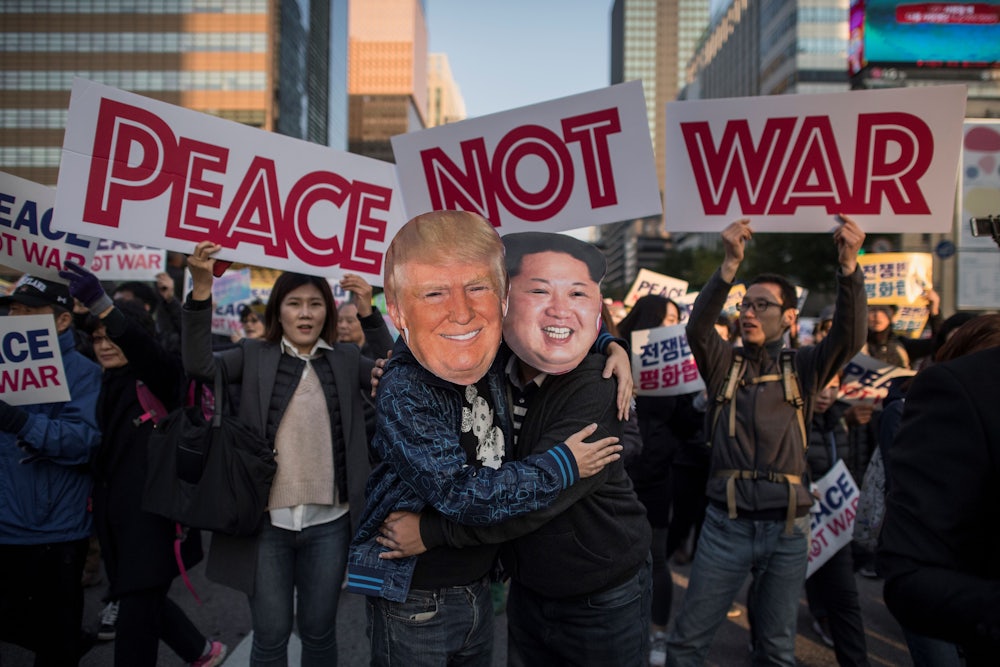Donald Trump made his first appearance last Saturday night at the annual Gridiron Dinner, where the president customarily delivers a humorous speech to assorted journalists and Washington luminaries. Trump’s speech was characteristically logorrheic, a discursive string of bullying insults against Joe Biden (“I would kick his ass”) and Elizabeth Warren (“I didn’t like that Pocahantas”) that, in retrospect, contained gleaming diamonds of meaning. At one point, he broke the atmosphere of strained bonhomie with what appeared to be a serious discussion of the North Korea question. “I won’t rule out direct talks with Kim Jong-un,” he said. “I just won’t.” He then delivered his only genuinely funny joke of the evening: “As far as the risk of dealing with a madman is concerned, that’s his problem, not mine.”
It is funny, yes, but in a way that makes one queasy. On Thursday, the White House shocked the world with the announcement, made with zero fanfare by a South Korean official, that Trump would be holding direct talks with Kim within two months. Trump accepted Kim’s offer of talks seemingly on a whim; it had been conveyed to him earlier that day by the South Korean official, Chung Eui-yong, who had met with Kim in Pyongyang on Monday as part of an ongoing thaw between the two Koreas that began with the North’s participation in the Pyeongchang Winter Olympics. In an instant, the escalating tensions between Trump and Kim over the past year had evaporated, insults (“little rocket man”) and counter-insults (“mentally deranged dotard”) were forgotten, and the United States and North Korea were on a pell-mell track to diplomacy.
This should be a cause for relief. Instead it has led to confusion, bitter recriminations, and the unpleasant lurching sensation that has become so familiar in the turbulent flight of this presidency. Diplomats are appalled that Trump has done the whole thing backwards: Leaders usually meet at the end of a painstaking diplomatic process, coming together at the top of the mountain of spadework done by armies of anonymous bureaucrats. The United States has conducted virtually no preparatory work for this effort; in fact, the administration’s top North Korean expert resigned in February, “reportedly in frustration at being kept out of key policy meetings,” according to NBC News. It was only a few weeks ago, after all, that Vice President Mike Pence refused to stand to honor the North-South joint delegation at Pyeongchang, suggesting that the chill between the U.S. and the North was as frosty as ever.
Furthermore, it appears Trump has left some significant players out of the loop. The New York Times report on the talks contains this disturbing sentence: “Mr. Trump also plans to call President Xi Jinping of China.” China’s response to all this might be important, yes. It is only North Korea’s closest ally, one keen on keeping a buffer between itself and the U.S.-aligned South.
In contrast, Kim appears to be acting with great deliberation. He has initiated every step of this process, from the initial overture to South Korean President Moon Jae-in that resulted in the Olympics breakthrough, to the latest olive branch to Trump. Analysts have swooped down in droves to remind the public that North Korea has long desired a face-to-face meeting between its leader and a sitting American president, since it would be a mark of legitimacy and respect, a propaganda coup that would shrink the world’s colossus down to the size of its feistiest rogue state. When you account for the fact that North Korea is unlikely to wind down its nuclear program—the ultimate goal, for the U.S., of the talks—then it becomes clear that Trump may have fallen into a trap that Kim has laid, like a cackling Bond villain, with utter transparency. “Kim played Moon and is now playing Trump,” an Obama-era national security aide told the Times.
There seems to be little doubt that, in a battle of wits, the president would lose. Still, talks are better than the alternative. And as Isaac Stone Fish has written for The New Republic, there is much to be gained from a summit even if Kim declines to give up his nuclear weapons: “It would allow the United States to assuage Pyongyang’s fear of invasion and regime change, in exchange for something meaningful in return, perhaps a freeze on missile testing. More importantly, it would increase trust between the two nations.” As Robin Wright chronicled for The New Yorker, a lack of trust has marred the U.S.’s approach to North Korea, particularly under Bill Clinton and George W. Bush. The North Koreans have been burned time and again, as the U.S. switches from rapprochement to isolation, from sanctions relief to “axis of evil,” on a dime.
Is Trump, America’s self-appointed madman, the person who can bring consistency of purpose to the U.S.’s relations with North Korea? Does he have the emotional fortitude and the intellectual wiles to salvage some material benefit for the United States from a summit that could easily descend into a farce? Does he have any other motivations besides turning the world into his stage, where he can tear his hair like Lear as the rest of us watch, enthralled, aghast? The answer to all those questions strongly point toward the negative.
But at least there is now a small hope—even if it is an infinitesimally small one—for a Nixon-in-China moment. Have stranger things happened? Well, no, not really. As far as the Trump administration is concerned, we may want to consider retiring the phrase.
